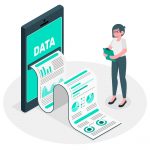As we move through the industrial revolution of data, companies are beginning to realize the inadequacy of traditional data management tools in handling the complexities of modern data. Many have had to experience rude wake-up calls with failed migration or transformation initiatives caused by poor data, missing data quality management systems, and a reliance on outdated … [Read more...] about Save Time, Increase Revenue with Automated Data Profiling and Data Cleansing Solutions
Big Data
Learn everything you need to know about big data. Find out how companies are using this revolutionary technology and what it means for your business strategy.
Protecting Consumer Identities And Privacy In The Time Of Pandemic
Every cloud has a silver lining. The pandemic has accelerated technology adoption and shifted focus to online ventures. Companies have been pushed into adopting remote work models and consumers have traded loyalties from their favourite brick and mortar shops to e-commerce platforms. Today everything from groceries to gold jewellery is being bought online. It's convenient and … [Read more...] about Protecting Consumer Identities And Privacy In The Time Of Pandemic
Has the In-memory Data Grid Overtaken the Distributed Cache?
As in-memory computing (IMDG) becomes more popular with different businesses and industries, distributed caching has seen less exposure and usage in recent years. Both technologies still hold the interest of data-centric organizations, but the IMDG has shown that it can do distributed caching and much more. Whereas distributed caches are simply caches distributed across … [Read more...] about Has the In-memory Data Grid Overtaken the Distributed Cache?
Why and how Nokia changed the game with people analytics
The article was originally published on Hyperight.com. What happens when a company grows so rapidly and its employee base increases three-fold? If you don't do it right, the culture will eat your strategy for breakfast, according to Mark Hayton, responsible for HR analytics and employee surveys at Nokia. Nokia's journey in the past 5 years has been a turbulent one, to say the … [Read more...] about Why and how Nokia changed the game with people analytics
How Big Data is Transforming the Construction Industry
Big data has gained significant traction in recent years, and this momentum has propelled it into almost every industry. The many steps and phases involved in construction make digital advancement necessary. With big data, the design, construction and integration stages are easier to manage and make even more efficient. Business decisions, too, thrive with big data. As the … [Read more...] about How Big Data is Transforming the Construction Industry
What is big data?
Big data is a term that refers to the massive amount of digital data created and shared every day. Big data can transform how we live, work, and communicate. It can be used to improve everything from public health and urban planning to business and marketing.
Big data is also changing the way we think about privacy and security. The volume, velocity, and variety of big data present challenges and opportunities for organizations and individuals. Regardless, big data is here to stay, and its impact will only continue to grow in the years to come.
What is big data analytics?
Big data analytics is the process of turning large, complex data sets into actionable insights. Businesses use various analytical tools and techniques, including machine learning and statistical analysis, to do this.
Big data analytics can be used to improve decision-making in areas like marketing, operations, and customer service. It can also be used to identify new business opportunities and optimize existing processes. With the help of big data analysis, businesses can gain a competitive edge by using their data better.
Want to learn more about big data? Datafloq has courses available. Contact us to get started.
When was big data introduced?
The term big data was coined in the 1990s, with some giving credit to John Mashey for popularizing the term. However, the concept of big data has been around for much longer.
Where does big data come from?
In the early days of computing, scientists and businesses began to realize that the amount of data being generated was increasing exponentially. As a result, they began to develop new methods for storing and processing data.
Over time, these methods have become increasingly sophisticated and have played a key role in enabling businesses to make sense of vast amounts of information. Today, big data is used in various industries, from retail to healthcare, and its importance is only likely to grow in the years to come.
What are examples of big data?
One of the most common examples of big data is social media data. With over 2 billion active users, Facebook generates a huge amount of data every day. This includes information on user interactions, posts, and even location data. Analyzing this data can help companies better understand their customers and target their marketing efforts.
Another example of big data is GPS signals. These signals are constantly being generated by devices like cell phones and fitness trackers. When combined with other data sets, GPS signals can be used to provide insights into everything from traffic patterns to human behavior. Finally, weather patterns are another type of big data set. By tracking these patterns over time, scientists can better understand the impact of climate change and develop strategies for mitigating its effects.
How do companies use big data?
Companies use big data in marketing, product development, and customer service. By analyzing large data sets, businesses can identify patterns and trends that would be otherwise difficult to spot. For example, a company might use big data to track customer behavior patterns to improve its marketing efforts.
Alternatively, a company might use big data to improve its products by identifying areas where customers are most likely to experience problems. For instance, big data can be used to improve customer service by finding pain points in the customer journey. Ultimately, big data provides companies with a valuable tool for gaining insights into their business operations.






